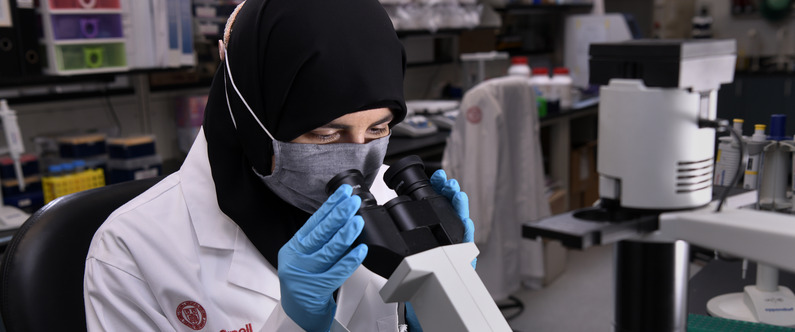WCM-Q researcher wins AHA Paul Dudley White International Scholar Award
 Dr. Isra Marei of WCM-Q, winner of the prestigious Paul Dudley White International Scholar Award.
Dr. Isra Marei of WCM-Q, winner of the prestigious Paul Dudley White International Scholar Award.
Dr. Isra Marei of Weill Cornell Medicine-Qatar (WCM-Q) has won the prestigious Paul Dudley White International Scholar Award, which recognizes the world’s best cardiovascular science and medicine research.
Dr. Marei, postdoctoral associate in pharmacology, received the award from the American Heart Association (AHA), during the Vascular Discovery: From Genes to Medicine Scientific Sessions 2023 in Boston, MA, USA. The award is named after one of the AHA’s founders, a champion for heart health who pioneered preventive cardiology. Since 2017, the award has promoted Dr. White’s vision for excellence in cardiovascular and brain health science. It is presented to the primary author of the highest-ranked scientific abstract from every participating country for each AHA scientific meeting.
Dr. Marei, whose research focuses on the use of blood progenitor cells for diabetes and cardiovascular applications, is a member of the research team of Dr. Christopher Triggle, professor of pharmacology at WCM-Q. She is also working toward engineering 3D vascular grafts for cardiovascular drug screening. The quality of her research was recognized in 2020 by the L’Oréal-UNESCO for Women in Science Middle East Regional Young Talents Program.
 (1).jpg)
The work that has been recognized by the AHA’s prestigious award is a part of an ongoing early career research project led by Dr. Marei. The work identified a link between the altered transcriptomic profile of blood endothelial progenitors, and the impaired repair and endothelialization processes in type 2 diabetes. Dr. Marei has led several research projects that aimed to provide a better understanding of the role of blood endothelial progenitors in diabetes-derived vascular dysfunction. This includes a postdoctoral research award project, and several student projects, in addition to the current early career project.
Dr. Marei said: “I am honored and humbled to have had my work recognized by the American Heart Association and to be able to work in such a fascinating field of research that has a beneficial impact on human health. The findings from our work provided new insights on the effects of type 2 diabetes on the vascular repair mechanisms which are influenced at a transcriptomic level. Blood progenitors emerged as a potential source for tissue engineering, regenerative medicine and cell therapy. Taking the dysfunction of these cells in diabetes, these applications should be tailored to address the dysfunction in these cells and provide more personalized therapeutic options for this specific population of patients.
“This work is the fruit of the valuable collaboration with local and international researchers and clinicians, in addition to the services and expertise provided by the genomics and bioinformatics cores at WCM-Q. I am grateful to all my co-authors who contributed to this research, particularly my mentor, Prof. Chris Triggle.”
Dr. Marei’s co-authors include Binitha Thomas, Omar Chidiac, Dr. Charbel Abi Khalil and Dr. Tanwir Habib at WCM-Q; Dr. Mohammad Jameesh, Dr. Amin Jayyousi, and Dr. Jassim Al Suwaidi at Hamad Medical Corporation; Dr. Blerina Ahmetaj-Shala and Prof. Jane Mitchell at Imperial College London; and WCM-Q medical students Ahmed El-Naas, Anam Ehtesham, Azwa Dilawar, and Leena Elsheikh Aboidris.
Dr. Khaled Machaca, professor of physiology and biophysics/senior associate dean for research, innovations, and commercialization at WCM-Q, said: “We are delighted that Dr. Marei’s outstanding contributions to her field of research has been recognized with one of the industry’s most important awards. Her impressive accomplishments to date are only exceeded by the wonderful potential her work holds for enhancing human health in the future.”
Dr. Marei has been extensively funded by Qatar National Research Fund (QNRF) through a Postdoctoral Research Award (PDRA), an Early Career Researcher Award (ECRA), and several Undergraduate Research Experience Program (UREP) awards investigating blood progenitors. Dr Marei’s host laboratory at WCM-Q has been supported by QNRF through multiple National Priorities Research Program (NPRP) and UREP awards, and several internal awards by WCMQ focused on cardiovascular physiology.
Acknowledgement: The work described in this article has been funded by an Early Career Researcher Award (ECRA02-007-3-006) from the Qatar National Research Fund (a member of The Qatar Foundation). Ahmed El-Naas, Anam Ehtesham, Azwa Dilawar, and Leena Elsheikh Aboidris were supported by a Student Research Mentorship Program (SRMP-5-3169) from Weill Cornell Medicine-Qatar. The contents herein are solely the responsibility of the authors.